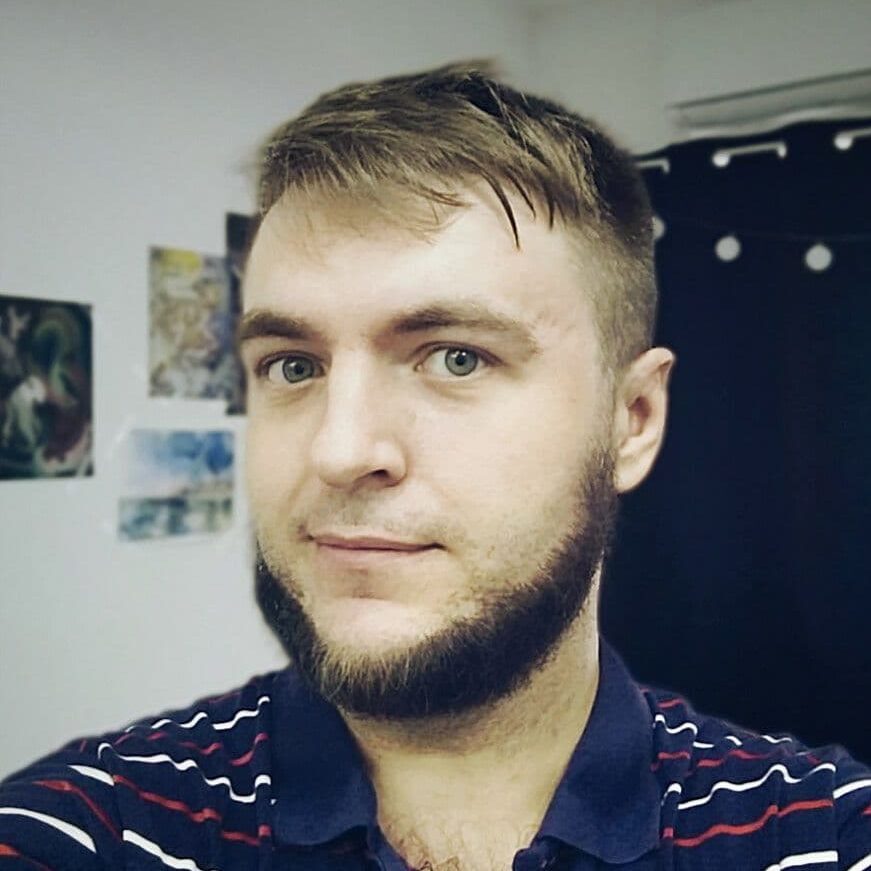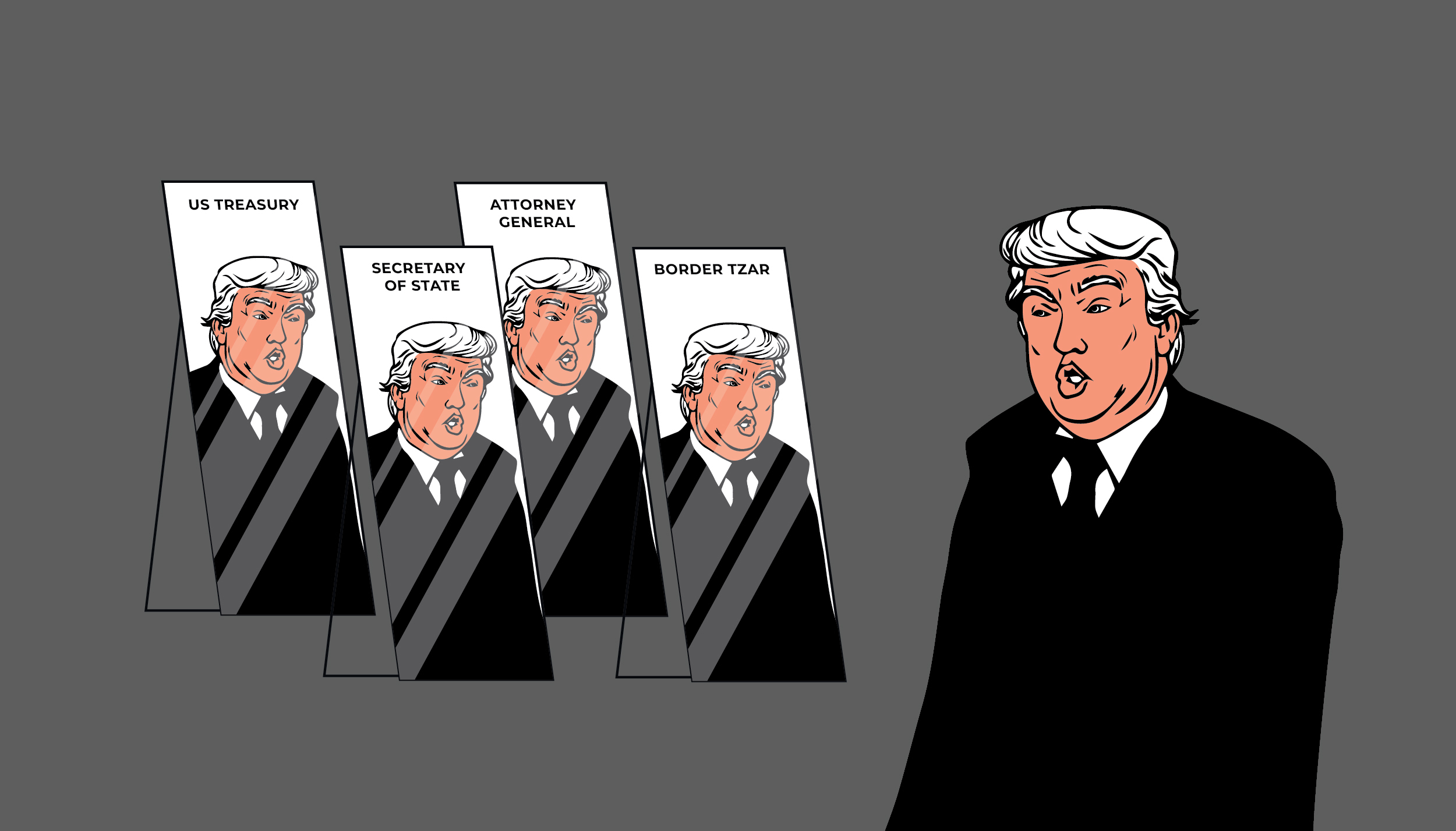

Українською читайте тут.
Detector Media delves into why some of the candidates for positions in Trump's administration have amused Russian propagandists and shocked American officials and media due to the threat of dismantling the checks and balances on Trump outlined in "Project 2025."
As Oleh Shamshur, former Ukrainian Ambassador to the U.S. (2006–2010), wrote in Dzerkalo Tyzhnya, Trump decided not to repeat the "mistakes" of his first term by avoiding the appointment of influential Republicans who might have their own opinions or oppose his "leadership vision" in his new administration. This time, the team was assembled very quickly, based on criteria of personal loyalty and willingness to unconditionally defend the leader's ideas before any audience.
Trump will assume presidential powers only after his inauguration on January 20, 2025. Although the lists of candidates for positions are not yet final, they offer insight into what Trump’s next presidential term might look like and amplify concerns about changes to the institutional framework of the state. Some appointments will require Senate approval, which, despite the Republican majority, could encounter difficulties. On November 20, Republican Party sources told The Hill that Vice President-elect J.D. Vance is leading efforts to persuade some senators who are hesitant about certain previously announced nominees. One such candidate, Matt Gaetz, whom Trump had proposed for Attorney General, withdrew his candidacy on November 21. Instead, the position is now being pursued by Pam Bondi, Florida's first female Attorney General. A Republican majority in both houses of Congress, a majority of Republican judges in the Supreme Court, and an administration built on the principle of personal loyalty give the 47th U.S. president an unprecedented concentration of power.
To study the reaction of Russian propaganda to potential appointments in Trump’s new administration, we analyzed a sample of 682 messages in Russian and pro-Russian Telegram channels published between November 11 and November 18. These messages contained a combination of the keywords "Trump" and "appointments" or "nominations," along with the names of the candidates. The data was provided by the company LetsData.
Overview of Trump's new cabinet candidates
In the context of Ukraine, many of the already announced members of Trump's new administration express skepticism about supporting Ukraine and have aligned their "de-escalation rhetoric" with the narrative of "Christian nationalism." They claim that continued bloodshed contradicts America's moral principles and should no longer be supported. Some of these individuals have even echoed Russian propaganda narratives.
For example, Tulsi Gabbard, the candidate for Director of National Intelligence, stated in interviews that Ukraine operates "biolabs" and does not deserve support because, in her view, it is not a democracy. She provided no evidence for these claims, which mirror statements made by high-ranking Russian officials, such as Irina Yarovaya, Deputy Chair of Russia's State Duma, after Russia’s full-scale invasion of Ukraine.
While Congress has announced intentions to investigate Gabbard’s past comments about Ukraine, which align with Russian propaganda, her appointment is still likely. On the surface, her military experience in various wars with the U.S. Army might suggest she understands Ukraine’s situation. However, her remarks, including those downplaying Russia’s security concerns, challenge this assumption even after her involvement in the Iraq War.
Trump has proposed Marco Rubio for Secretary of State, a politician who sees China, not Russia, as the primary threat to the U.S. Regarding Ukraine, Rubio has suggested that the war should end and that Ukraine needs to start negotiations.
The role of Secretary of Defense may go to Pete Hegseth, a Fox News host and veteran. Illinois Senator Tammy Duckworth commented to CNN that Hegseth lacks the qualifications and experience necessary for the role. Republican senators are divided on his nomination, with most declining to comment on whether allegations of sexual misconduct against Hegseth will affect their votes. Hegseth has previously advocated for “somewhat restriction” on aid to Ukraine and expressed skepticism about U.S. involvement in NATO.
John Ratcliffe is expected to return as CIA Director. Ratcliffe was a key driver of investigations related to Hunter Biden's laptop, which has fueled conspiracy theories propagated by Russian and Chinese actors. These theories suggest that, during his tenure as U.S. Vice President, Joe Biden manipulated Ukrainian institutions for his own benefit and engaged in corruption in Ukraine. Republican politicians from the MAGA faction have supported this theory, using it as a pretext to limit aid to Ukraine. This narrative played a role during the approval process of the most recent Ukraine aid package as of late November. Notably, Marjorie Taylor Greene, whom Trump plans to nominate to a new department under Elon Musk’s leadership, has been an outspoken advocate of reducing aid to Ukraine.
The role of the U.S. Ambassador to the United Nations Security Council in New York is critical for consolidating diplomatic support for Ukraine. Trump plans to appoint Elise Stefanik to this position. Stefanik has been a staunch supporter of Trump, defending him during both impeachment trials in his first term and voting for his agenda three out of four times in the House of Representatives. While she expressed support for Ukraine after February 24, 2022, citing the importance of "supporting democracies under attack," she voted against a U.S. security assistance package for Ukraine in April 2024.
A potential positive for Ukraine could lie in the appointment of Mike Waltz as National Security Advisor. According to former Ukrainian Ambassador to the U.S., Oleg Shamshur, Waltz is among the few Trump loyalists with the necessary competence and professional background to perform the duties effectively. Waltz’s policy priorities are expected to focus on countering China. He has previously called for European partners to shoulder more financial and military support for Ukraine. His stance also includes backing a peace plan aimed at aligning Ukraine more closely with Western alliances and diplomatically isolating Vladimir Putin.
The role of a Special Envoy for Ukraine, which existed during Trump’s first term under Kurt Volker, remains uncertain this time. Media reports suggest possible candidates include Brian Hook, a diplomat primarily focused on Iran with no experience related to Ukraine, and Trump’s attorney, Boris Epshteyn, a Moscow-born lawyer.
Another significant appointment for Ukraine could be Chris Wright as Secretary of Energy. Wright, the founder and CEO of an oil services company, lacks political experience but, according to the Financial Times, supports Trump’s plan to expand liquefied natural gas (LNG) exports, reversing a moratorium imposed by President Biden. Wright denies the existence of a climate crisis, which likely means the Department of Energy would reduce involvement in green energy projects under his leadership. The department also plays a role in U.S. "energy diplomacy," setting export-import priorities for energy resources.
According to analysts Robert Benson and Johan Hassel from the Center for American Progress, the rise of MAGA-aligned politicians has prompted the Republican Party to reassess its foreign policy priorities, including its stance on Ukraine. Some Republican senators who previously supported aid for Ukraine, such as Mitt Romney (Utah) and Joni Ernst (Iowa), are now forced to respond to the party’s shifting agenda, which is increasingly focused on domestic issues.
Reactions from Russian propaganda channels to Trump's appointments
One of the analyzed anonymous Telegram channels claimed that Trump "broke the record" for the speed of forming his team, completing it in just 12 days after the election. In contrast, after being elected, Biden took 40 days to form his administration. Sanctioned Russian TV host and propagandist Ruslan Ostashko shared his reaction on his Telegram channel regarding the symbolic meeting between Trump and Biden at the White House for the transition of power:
"For us (Russia — Detector Media’s note), the quiet and even familial meeting between Trump and Biden at the White House was a signal. This means that the U.S. 'deep state' has reached an agreement. Zelenskyy, I think, is still in shock from the footage of the two old men having a pleasant conversation."
On October 16, an anonymous propaganda Telegram channel with 117,000 subscribers claimed, "Bankova [the Ukrainian presidential office] is getting nervous about Trump's appointments" and comments from his team about quickly ending the war. According to the publication, there is a "battle for Trump," meaning a struggle for influence over him. The propagandists wrote that the "party of war" in the U.S. and Volodymyr Zelenskyy, who are supposedly interested in the "endless continuation of the war," are losing this struggle for influence over the newly elected U.S. president. The Telegram channel of the sanctioned outlet Strana spread similar messages. While its website is inaccessible in Ukraine without a VPN, its Telegram channel remains available and has 291,000 subscribers. Overall, the conspiracy theory about the influence of the "party of war" was mentioned nine times in discussions by propagandists regarding Trump's appointments.
Despite initial discussions about including former U.S. Secretary of State Mike Pompeo and former U.N. Ambassador Nikki Haley in the new administration, Trump decided not to involve them. Nevertheless, these names were mentioned 16 times in the analyzed sample of Telegram channels. Ostashko, in a post with over 85,000 views, stated: "Pompeo was supposed to become Kyiv's agent in Trump's administration." An anonymous channel with nearly 440,000 subscribers picked up this narrative, explaining why Trump excluded Pompeo, alleging:
"Pompeo was rejected not only as a 'hawk' but also because he is deeply embedded in today's Ukraine. A year ago, he joined the board of directors of the largest telecom operator, Kyivstar. This was a cunning plan by Yermak to build a bridge to Trump in case of victory. That bridge turned out to be unreliable and has already collapsed."
The appointment of Marco Rubio as Secretary of State, according to posts by anonymous propagandists on a Telegram channel with nearly 600,000 subscribers, signals a shift in U.S. policy toward ending military and financial aid to Ukraine:
"Marco Rubio admits that the U.S. is investing money in a stalemate in the Ukrainian conflict. Yesterday, Trump appointed Rubio as Secretary of State for his future administration. If Rubio is already making such statements, Zelenskyy surely won’t get any new money from the U.S. after the inauguration."
However, the authors of the channel misrepresented Rubio's comments. In an interview on Today the day after the election, Rubio stated that the U.S. does not support Putin’s policy on Ukraine and that discussions about Ukraine's position would require a broader interview.
Rubio was mentioned 70 times in the analyzed sample. Former Ukrainian MP and fugitive to Russia Oleg Tsaryov wrote on his Telegram channel that he "does not believe in significant changes to Marco Rubio's views," despite Rubio being among 15 Republican senators who did not support a Ukraine aid bill in April 2024. Tsaryov noted that Rubio had been a vocal supporter of strict financial sanctions against Russia after the annexation of Crimea in 2014 and advocated for more stringent enforcement of sanctions, particularly against Russia's oil fleet, in 2022. Tsaryov added:
"Moreover, Rubio comes from a family of Cuban immigrants (though his parents left the country shortly before the revolution), a community whose Russophobia can only be rivaled by Ukrainian immigrants."
The most striking reaction to the discussion of a U.S. special envoy's role in Ukraine came from Russian "Orthodox" oligarch and owner of the Tsargrad TV channel, Konstantin Malofeev. On his Telegram channel, Malofeev dismissed the need for any dialogue with the U.S. on Ukraine, calling all Ukrainian territory "a sphere of vital interests of the Russian world." He wrote that one of the main reasons Putin launched the full-scale invasion of Ukraine was to prevent its accession to NATO. In a post that garnered nearly 475,000 views, the Russian oligarch reiterated his belief that the new U.S. administration should return to a "Cold War" dialogue format, where two superpowers decide the fate of the entire world:
"This is why a U.S. special envoy for Ukraine is completely unnecessary. Russia needs a special envoy for the entire world order because the whole world is a field of interest for the United States and Russia."
The "great and terrifying 'Project 2025'"
Despite initial denials from Trump’s team, the ultra-conservative Project 2025 may become his policies' foundation. During one of his campaign rallies, Donald Trump mentioned Tom Homan in the context of his future administration: "You’ve seen Tom Homan. He’s joining us." Trump has already announced Homan’s appointment as “border czar.” Homan, one of the project’s authors and an active member of The Heritage Foundation (which developed the plan) is a staunch advocate for stricter immigration control.
Project 2025 outlines a strategy to strengthen presidential power, bypassing or eliminating checks and balances. Detector Media already reported that the project recommends that complete loyalty to Trump’s beliefs and ideas will now be the primary criterion for appointments and dismissals in government service and senior positions. The project also proposes a significant expansion of the president’s appointment powers.
The BBC analyzed critical elements of the nearly 900-page Project 2025. Journalists identified four main political goals: 1) Restoring the family as the center of American life; 2) Dismantling the administrative state; 3) Protecting the country’s sovereignty and borders; 4) Ensuring God-given human rights to live freely. The project proposes placing the entire federal bureaucracy under direct presidential control, including independent agencies like the Department of Justice.
Among the proposals is eliminating job protections for thousands of civil servants, who political appointees could replace. The document describes the FBI as "a bloated, arrogant organization increasingly violating the law," calling for a radical overhaul of it and other agencies, as well as the elimination of the Department of Education. In its analysis, the Center for American Progress labeled the project as a path to an "imperial presidency," threatening the 250-year-old system of checks and balances that underpins American democracy and expanding the influence of ultra-conservative politicians over American lives.
Ukraine is barely mentioned in the document, and where it does appear, it is primarily in the context of the war, with little specificity. While Russian aggression against Ukraine is condemned, the document includes calls to "replenish the arsenal depleted by aid to Ukraine" and emphasizes that China poses a much more significant threat to the U.S. than Russia.
One should not forget about the appointment of the White House Chief of Staff. Trump plans to appoint Susie Wiles, his campaign manager, as Chief of Staff. Though primarily an administrative role, according to Project 2025, the Chief of Staff will set policy priorities and delegate tasks to the National Economic Council, the Domestic Policy Council, and the National Security Council. These bodies are instrumental in decisions on financial and military aid to Ukraine. As Wiles’ political views remain unclear as of late November, there is a risk that certain Ukraine-related issues could be delayed or ignored, depending on how administrative tasks are executed.
Another sign that Project 2025 could shape Trump’s policies is the proposal to create a "Department of Government Efficiency," led by businessman and Ukraine skeptic Vivek Ramaswamy and billionaire Elon Musk. Their primary task would be to audit all government institutions. While this sounds noble on paper, Project 2025 frames it as a means to dismiss civil servants deemed disloyal to Trump’s agenda, remove checks on presidential power, and cut resources for “less critical” ministries and initiatives. In a press release on these appointments, Musk is quoted as saying: "This (the elimination of hundreds of federal agencies – DM’s note) will send shockwaves through the system and everyone involved in 'wasteful government spending'—and that’s a lot of people."
A Wall Street Journal investigation published on October 25 revealed ongoing conversations between Elon Musk and Vladimir Putin since late 2022. Musk’s regular contact with the Kremlin has raised alarm among U.S. national security officials. Former Ukrainian Ambassador to the U.S. Valeriy Chaly noted that Musk’s actions suggest he aims to position himself as a real—not merely symbolic—mediator in Ukraine-Russia negotiations, given his business interests in both countries. Ukrainian authorities must carefully address Musk’s recent overtures toward Volodymyr Zelenskyy.
The announcement of Musk’s potential role in the new "Department of Government Efficiency" was described by an anonymous Telegram channel with over 113,000 subscribers as "a significant blow to Kyiv and Zelenskyy." The channel promoted narratives about the "inefficient use of U.S. aid," claiming this would lead to "the collapse of support for Zelenskyy both domestically and internationally." However, the U.S. Agency for International Development (USAID) regularly inspects how aid to Ukraine is utilized.
Propaganda channels have also labeled Musk the "shadow vice president responsible for globalism." They predict that once Trump’s team, led by Musk and Vice President J.D. Vance, overcomes resistance from the so-called "deep state," they will inevitably "negotiate with Russia on a global security framework." The authors advocate beginning such dialogue with Russia immediately.
Russian publicist Stanislav Belkovsky claimed on his Telegram channel that Trump would use Project 2025 as the blueprint for his second term. According to Belkovsky, Trump’s recent appointments confirm this, as his inner circle will now consist of "indoctrinated, relatively young, non-corporate loyalists—true Trumpists, who are not poisoned by the corporate solidarity of the deep state."
The propaganda campaign aims to establish Russia as an indispensable geopolitical player with whom any U.S. administration must engage regardless of political stance. This strategy seeks to position Russia as a crucial partner in global problem-solving while exacerbating internal divisions within the U.S. Simultaneously, Russian propaganda highlights the anti-Ukrainian stances of some key nominees in Trump’s potential administration, attempting to weaken U.S. support for Ukraine.
Main page illustration: Natalia Lobach


